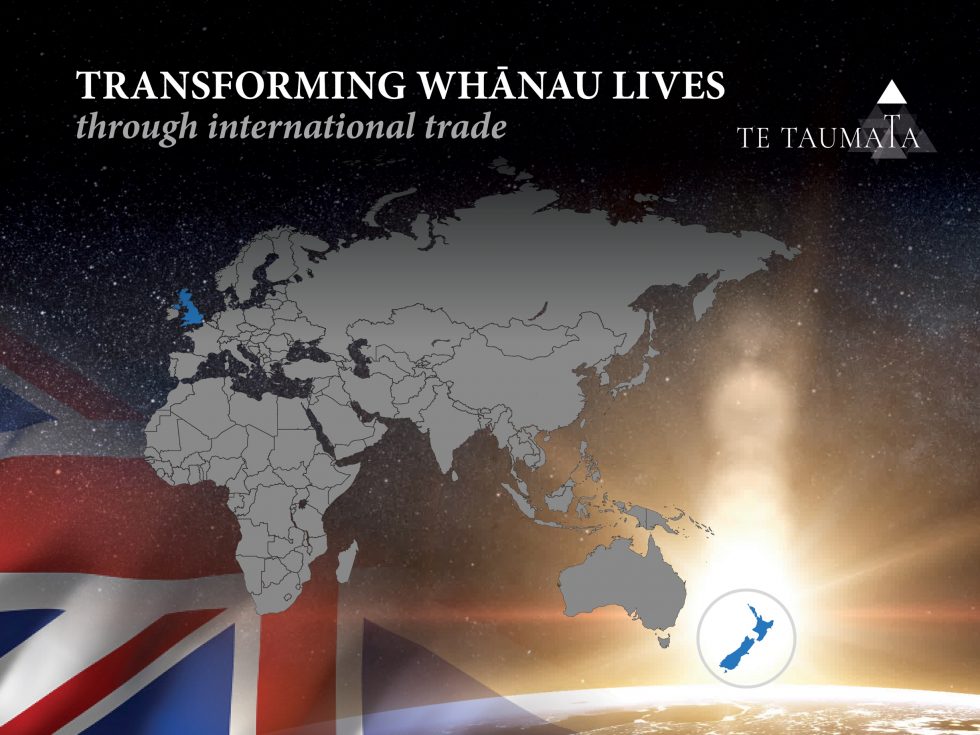Aotearoa’s trade relationship with the UK is long-standing and substantial. The UK is our seventh-largest trading partner, with two-way trade of more than $6 billion (pre-COVID) in the year to March 2020.
The historic signing of the new NZ/UK Free Trade Agreement (FTA) is set to elevate this relationship to a whole new level, opening new doors for trade, particularly for our Māori exporters.
From the outset, Te Taumata was at the forefront of negotiations, ensuring Māori had a strong voice at the table.
This included bringing Māori exporters and trade leaders together with ministers and negotiators through face to face regional hui, resulting in unprecedented Māori engagement.
This mahi has contributed to an international agreement that is respectful and inclusive of Te Ao Māori aspirations, our knowledge systems and our beliefs.
In a series of pānui, Te Taumata will lay out some of the key advantages of the NZ/UK FTA and how we can use this as a benchmark for future trade agreements.
Today’s pānui focuses on the key goods market access outcomes.
Outcomes at a glance
The market access package is among the best Aotearoa has ever secured in a FTA. At full implementation, tariffs will be eliminated on all exports to the UK. On day one, 99.5 per cent of current New Zealand trade will enter the UK duty-free, through a combination of tariff elimination and duty-free quotas. The quota ceiling will grow over time and then be removed.
Modelling suggests that at full implementation, NZ goods exports to the UK will increase up to 53 per cent, NZ GDP will increase by between $700 million and $1 billion, and tariff savings on NZ exports is estimated at $37.8 million per year based on current export volumes.
The FTA has prioritised tariff elimination on a range of products that are either of interest to Māori, or are owned largely by Māori. Te Taumata considers this a monumental win for our people as it creates a fair market Māori can – and will – prosper in.

Horticulture
- Tariffs will be eliminated from day one on products such as wine (export value $463m), honey ($69.7m), onions ($8m), and kiwifruit (UK imports NZ$4.4m).
- Tariffs will be eliminated over three years for apples (export value $63.6m), with a significant new duty-free quota for off-season exports for the first three years.
Fish and Seafood
- 46 per cent of New Zealand’s current fish and seafood will enter the UK duty-free when the FTA comes into force, 99.5 per cent within three years, and 100 per cent within seven years.
- Tariffs will be eliminated from day one on hoki (export value $2.2m), and on mussels after three years ($6.4m).
Dairy
- 60 per cent of New Zealand’s current dairy trade will enter the UK duty-free when the FTA comes into force, 99.5 per cent within five years, and 100 per cent within seven years.
- Tariffs will be eliminated over five years for butter (export value $1.6m) and cheese ($500k), with significant new duty-free quotas that will allow trade to grow during the transition period until all tariffs and quotas are eliminated.
Meat
- Tariffs will be eliminated after 10 years for beef (export value $4m). A product-specific safeguard may then apply until year 15.
- Tariffs will be eliminated after 15 years for sheep meat (export value $366.1m).
- Significant new quotas will be established for both products, which will allow trade to grow during the transition period until all tariffs have been eliminated.
Forestry
- Nearly all wood and forestry products already enter the UK tariff-free.
- Any wood and forestry products that currently face tariffs (of up to 10 per cent) will receive tariff elimination when the FTA comes into force, creating new market opportunities.
Māori are well represented in both workforce and leadership in many of these sectors and these new rules will undeniably create more equitable market access.
Our next pānui in this series will focus on protections of our Intellectual Property (IP) and the Māori Trade and Economic Co-operation chapter.


